|
|
|
Sort Order |
|
|
|
Items / Page
|
|
|
|
|
|
|
| Srl | Item |
| 1 |
ID:
084938
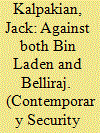

|
|
|
|
|
| Publication |
2008.
|
| Summary/Abstract |
The question about the relationship between al-Qaeda and terrorist organizations operating at the national, regional and international levels has been at the centre of the debate concerning appropriate policy responses to both. Debates focus on the question whether to treat terrorism mostly as a home-gown, grassroots phenomenon, or something significantly inflamed by foreign encouragement and sponsorship. Evidence from Morocco suggests that the national and regional terrorist organizations exhibit varying degrees of affiliation with al-Qaeda, ranging from acting as local franchises to complete independence.
The Moroccan state's response to this flexible situation is evaluated in the three case studies, each reflecting the case of terrorist organization or cell that has been dismantled. They show that Moroccan anti-terrorism policy has been generally successful, despite some erosion in human rights. The framework used in the study examines the sequence of events that led to the dismantling of the organization studied, the demographics of its membership, its ideology, and its targets. The holistic response, which combines heightened levels of law enforcement, socio-economic reform, and religious restructuring, is helping Morocco with its war against both domestic and international terrorism and may offer hints for counterterrorism elsewhere.
|
|
|
|
|
|
|
|
|
|
|
|
|
|
|
|
| 2 |
ID:
084940
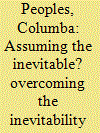

|
|
|
|
|
| Publication |
2008.
|
| Summary/Abstract |
Is armed conflict in and from space inevitable? In recent years a consensus has emerged that space has become increasingly militarized - in the sense that technologies placed in outer space are increasingly used to facilitate and augment traditional military activities. But actual use of weapons in or from outer space remains highly controversial. The aim of this article is to assess the attitudes of major space-faring powers towards space weaponization. Central here, the article argues, is the question of whether the weaponization of space and/or conflict in space (taken here to mean the occurrence of military conflict in outer space itself, or from the Earth directed at any systems deployed in outer space) is inevitable, and the extent to which the major space powers espouse this proposition. This article shows that the idea of inevitability retains a prominent place (although for subtly differing reasons) in American, Chinese, and Russian perspectives on space weaponization. What it is that is inevitable frequently varies, based on assumed but underspecified technological developments. This risks creating a discursively constructed security dilemma that increases the likelihood of actual space weaponization. It leads to the conclusion that renewed negotiations between the major space powers and international cooperative agreements are essential to combat the fatalism of the inevitability thesis.
|
|
|
|
|
|
|
|
|
|
|
|
|
|
|
|
| 3 |
ID:
084948


|
|
|
| 4 |
ID:
084955
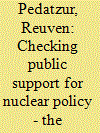

|
|
|
| 5 |
ID:
084943


|
|
|
|
|
| Publication |
2008.
|
| Summary/Abstract |
Iran's nuclear programme has brought ever-sharpening conflict with Israel, the United States, and the European Union. The Iranian public has been actively drawn into this debate, as the Iranian government cultivates support for its actions and by foreign appeals for change (including Bush administration support for regime change). This article explores data relating to public support for Iran's nuclear program. We utilize data from a nationally representative, face-to-face poll fielded in Iran in late 2006. The poll (n = 1,000) queried respondents about numerous domestic and external security concerns, including Iran's 'full nuclear fuel cycle' program. We present data on Iranian beliefs about Iran's nuclear program and the determinants of those beliefs. After discussing poll methodology and data integrity, the paper presents summary statistics on key variables about the nuclear program. We estimate three logit models to explain respondent beliefs about the program. The dependent variables address support for the program, the economic importance of the nuclear program, and beliefs that Iran will weaponize. Iranians' support for the program correlates with perceived status and deterrence benefits conferred by the program and opinions of the United States. Respondents' concerns about Israel do not drive support for the program. The paper concludes with a discussion of lessons learned from this study for future work of this type in Iran or other coercive environments.
|
|
|
|
|
|
|
|
|
|
|
|
|
|
|
|
| 6 |
ID:
084950
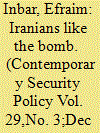

|
|
|
| 7 |
ID:
084953


|
|
|
| 8 |
ID:
084936
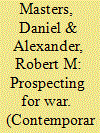

|
|
|
|
|
| Publication |
2008.
|
| Summary/Abstract |
Abstract Current literature on the foreign policy process focuses almost entirely on elite packaging of foreign policy prospects with little attention to why the general population accepts or rejects their choices. A more complete understanding of the democratic foreign policy process requires knowing the conditions when people will accept elite guidance. We use prospect theory - model of decision-making that suggests people are inclined to escalate risks to avoid or recover losses - in order to understand the way in which context and emotions shape perceptions and support of foreign policy options. Prospect theory helps to explain the significance of elite behaviours such as threat inflation, which are designed to link discrete foreign policy actions to conditions related to intensely emotional events in order to advance a preferred policy. To illustrate the utility of prospect theory to the foreign policy process, we turn to the Iraq War policy process, and why the Bush administration found a receptive audience to its public sale of the war. This study concludes that perceived losses in the security condition of the United States caused by the 9/11 terrorist attacks provided a context used to frame the decision for war with Iraq. The public sale of the war involved efforts by senior officials to link Saddam Hussein to terrorism and 9/11, casting a particular frame that was more likely to win acceptance of risk-seeking behaviour by the public. This, combined with a collapse in elite opposition that could counter-frame the option for war, contributed to an alignment in public perceptions of terrorist threats and support for offensive war with Iraq as a prospect to escape the threat of terrorism.
|
|
|
|
|
|
|
|
|
|
|
|
|
|
|
|
| 9 |
ID:
084939


|
|
|
|
|
| Publication |
2008.
|
| Summary/Abstract |
The collapse of the Soviet Union raised concerns about the fate of its nuclear weapons and led the United States to fund what came to be known as Cooperative Threat Reduction (CTR). This includes programs that fight the proliferation of weapons expertise by providing short-term income and eventual re-employment of former Soviet WMD experts in civilian fields. Using case studies, based on archival research and extensive interviews, this article argues that CTR's three main 'knowledge non-proliferation' efforts have largely failed at their given task. Although programs have worked with many former Soviet WMD experts, few have been re-employed. Each program has also come to emphasize the number of people engaged rather than re-directed and to have less regard for their WMD skills. Moreover, this shift in goals, and the metrics each program uses to measure progress, led to serious political disputes between Moscow and Washington. Besides being unable to demonstrate success at their original non-proliferation goals, these programs use metrics that threaten to upset the fragile US domestic political consensus for future work in Russia.
|
|
|
|
|
|
|
|
|
|
|
|
|
|
|
|
| 10 |
ID:
084941
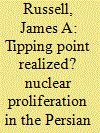

|
|
|
|
|
| Publication |
2008.
|
| Summary/Abstract |
The Persian Gulf and the wider Middle East are precariously perched on an uncertain nuclear threshold. Several regional states may be reconsidering their non-nuclear status. Iran's confrontation with the international community over its refusal to honour its obligations under the Nuclear Non-Proliferation Treaty is the overriding component states are viewing. Another element is Israel's nuclear program and its policy of preventing any regional state from threatening the Jewish state with nuclear weapons. Another complicating element in the strategic framework is a resurgent interest in nuclear energy.
What is the security policy community to make of these dynamics in which proliferation, deterrence, extended deterrence, and conflict escalation are all interacting in a complex interstate bargaining framework? This article applies a series of competing theoretical explanations for nuclear proliferation and assesses the implications they offer for policy prescriptions. Stressing neo-realist insights, it is shown here that control of proliferation requires recognition that the Middle East security dilemma has been altered - probably permanently - by the American invasion of Iraq, the increased political influence of Iran, and the continued violent spiral in the Arab-Israeli dispute. These three factors have combined to create new internal political pressures on regional regimes while at the same time creating a new and disturbing regional distribution of power that is shaping the region's approach to nuclear issues. Dealing with these factors is crucial in developing policies that can mitigate the further spread of nuclear weapons in the region.
|
|
|
|
|
|
|
|
|
|
|
|
|
|
|
|
| 11 |
ID:
084952
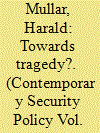

|
|
|
| 12 |
ID:
084945


|
|
|
| 13 |
ID:
084935


|
|
|
|
|
| Publication |
2008.
|
| Summary/Abstract |
Why do American presidents, when engaged in military coercion, sometimes bluff or exaggerate their resolve and other times do not? Bluffing increases the likelihood and lowers the cost of success, so a failure to bluff provides an intriguing puzzle. It is argued here that American presidents are more likely to bluff resolve when they face an opposition with a dovish public image, and when that opposition perceives a low likelihood that the adversary will call its bluff. The analysis of presidential signalling of resolve in Kosovo and Iraq supports claims by Kenneth Schultz that the opposition party has a tendency to expose presidential bluffing. I also show, however, that the opposition is significantly more likely to expose presidential bluffing when its party has a hawkish image - the public perception of the party's competence on national security and its willingness to use force - and when the opposition perceives a high probability that the bluff will be called. When the president knows the opposition is likely to expose a bluff, it makes sense for him to refrain from overstating resolve. Presidential bluffing is likely to occur when the opposition party has a dovish public image and when the opposition perceives a low probability that the bluff will be called. These findings have direct implications for American leaders and American threats to use force after the end of the George W. Bush presidency.
|
|
|
|
|
|
|
|
|
|
|
|
|
|
|
|
|
|
|
|
|